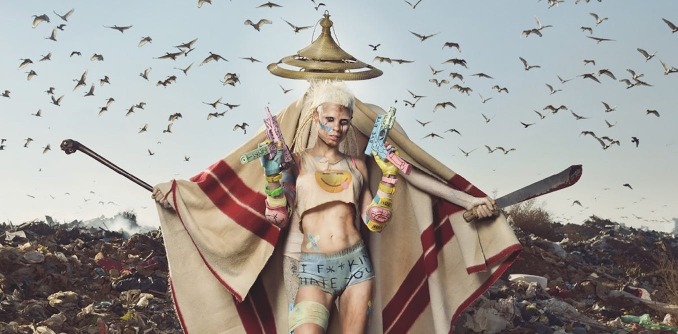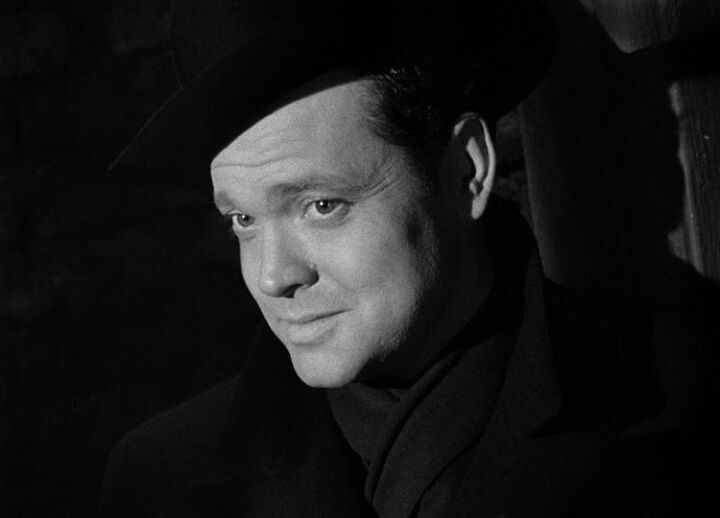Hot, Plastic, and Shitty: The Future Foretold by M.I.A.
- 10 minutes read - 1971 wordsRob Harvilla recently covered M.I.A’s “Paper Planes” on his podcast and the discussion dropped me right square in 2004 Mountain View listening to San Jose State student radio. In an era of Hoobastank and Evanescence, her first song, Pull up the People hit like a ton of space invader bits with its originality and appetite for confrontation.
Pull up the people
Pull up the poorSlang tang
That’s the that M.I.A. thang
I got the bombs to make you blow
I got the beats to make you bang bang bang
It felt like I was hearing the future. It was Marxist/insurgent/militant sentiment and resentment standing on top of an anti-capitalist and anti-globalist platform as described in Hardt & Negri’s Empire.1 . The album art and her videos had a complete visual aesthetic: bright, garish, and adjacent to street art or 8-bit video games. Her fashion integrated the fast-fashion (bright, garish, produced in southeast Asia, petrochemical-laden, and cheap) demands of the slavering jaws of Western consumerism. She took Target basics like ugly t-shirts and bike shorts and crossed them with blingy hip-hop street style as ripped off the streets of Mumbai, Colombo, Delhi, or Rio. It was a whole declaration.
With its square beats and computer-inflected … noise you could feel the anger and the sense of how much of a fuck she did not give.
Said M.I.A. in Spin of the era: “I don’t just want to talk about coming from a war…I want to talk about…how the first world is collapsing into the third world.”
With New York and its skyline still reeling from the terror that third-world agents can unleash, this seemed prophetic and frightening. For Westerners who’d matured under the Pax Americana in the 70’s-90’s, it was hard to legitimately imagine what a collapsed Western society might look like. Surely not National Socialism, certainly not Shining Path socialism. What would that blighted end-state look like?
About that same time, the South African hip-hop/rave/wtf band, Die Antwoord raced onto my radar. They were 23 minutes into the future of where M.I.A. was seeing culture heading.

Die Antwoord: Trash and a lithe sexuality
As part of their zef aesthetic, they would unite dated, shitty clothing, weed-whacker-delivered hair styles, daring tattoos, violence, outrageous sexuality, and horror film elements. Said Yo-Landi Visser, half of the duo: “[Zef is] associated with people who soup their cars up and rock gold and shit. Zef is, you’re poor but you’re fancy. You’re poor but you’re sexy, you’ve got style.” In short, nihilistic, sexy, tattooed, and pugnacious. I recall interviews with the duo: they stood in dusty roads amid modest, sun-scarred, cinderblock homes in Johannesburg. They looked and felt like the visual aesthetic to accompany Tom Friedman’s book Hot, Flat, and Crowded.
If M.I.A. was telling where we were going, Die Antwoord were a time capsule from the future sent back in time to help our stymied imaginations.
The Future, Imagined
Right. So there, in 2004 or so, between these two performers’ artistic projections, I could imagine a hot, dusty, mass-produced future for the many. We all hang our festively-colored, Shanghai-produced, plastic spaghetti strainers on plastic hooks in exchange for microplastics in our gametes. We accept antibiotic-laden meat because meat is prosperity and encourages the base to turn out in elections because how can you be doing poorly if you’re eating meat, right?
It was a world where the until-recently-wealthy were suddenly made personally aware of the fact that their comfort, their ACs running affordably in summer and life built on the petrodollar, had been zero-sum at the expense of someone else, somewhere else, with (likely) a drastically different skin color.
It was a world of gated communities flanked by armed guards – as is not uncommon in Die Antwoord’s native South Africa. It’s a world where the wealthy haven’t accumulated a bit more, a Lincoln to your Ford, but have accumulated most everything. You are suffered at their pleasure. It’s a world of Musk- or Bezos-level hyperwealth where they and their oligarchic peers live comfortable lives in gated communities, on private islands, or, hell why not, space.3 While everything down below or outside the gates gets hotter, dustier, plasticer, and more reactionary, they can live sequestered lives.4 Their only real fear is Dr. Guillotine’s device, but with sufficient government capture and a private pilot on standby, that can be managed as well.
I imagined children gathered by the trash fire huffing its fumes and listening to their elders tell stories of the days gone by. “Once,” the grandparents would relate to the dirty children dressed in corporate branded T-shirts, “prosperity was spread, visibly – and indeed, perhaps imperfectly – about, but, now, the affluence has disappeared into the gated environs/offworld.”
Desperation feeds on that disillusionment; the children’s hunger leads to crime; crime leads to the wealthy supporting an ever-more militant state and an ever-more aggressive form of policing; disinformation and propaganda use wedge issues to keep the dissenting rabble from uniting while using them as purity tests. Facile appeals are made via propaganda and entertainment to conscript dupes into being enforcers of the oligarchs’ hegemony. Any honest champion of the masses interests is distrusted because they’re just wielding the mob to get themselves inside the gated walls. The cynicism rots everywhere, equally all at once.
And, of course, this chaos is the breeding ground for fascists, authoritarians, and anarchists. Oh, and criminals. Just as Harry Lime needed post-war Vienna, with its chaos and cynicism wherein to poison children, this late-stage capitalist hellscape / oligarchic feudalism will mint Robin Hoods…and con men.

The incomparable Orson Welles as Harry Lime
And that’s where “Paper Planes” comes in. M.I.A.’s told us where the world’s going and will now provide the playbook of those who will thrive. They’re going to beat a corrupt system that has co-opted the state’s localized monopoly on violence with street violence and hacking. If the system serves robber barons, they’re going to figure out how to skim the barons’ blessings. And within their small demimonde, they’re going to revert back to the violence of the Borgias with the swagger of rap artists. To paraphrase Harvilla, they will live " …a celebration of wealth and the bursts of violence required to obtain [it]." “Paper Planes” is not a promise, but it’s a prediction that America isn’t working terribly hard to thwart.
The Song
Strictly speaking, the plan for the song’s narrator is this:
- Cross the border
- Falsify documents (“catch me at the border, I got visas in my name”)
- Sell official documents (“I make ’em all day”)
- Use that as startup capital for a drug hustle (“Every stop I get to I’m clocking that game / Everyone’s a winner, we’re making our fame”)
- All I wanna do is (gunfire) and (cash register) and take your money'
But for me, I don’t view this as petty criminality. I think M.I.A. was aiming larger. The narrator is someone from a country adjacent to wealth. He realizes that there’s an ocean’s worth of people like him looking for a foot in the host country – that’s why he’s there falsifying documents.
And while the word “host” might call to mind a notion of parasite and host, I think it’s different. The criminal narrator is stating something subtle and insightful: it’s not his fault that the demand in the host is so goddam bottomless. It’s not his fault that his own nation is so comparatively impoverished by forces so beyond his control: depressed Chinese exchange rates and the IMF.
As multiple druglords have noticed, the greatest geographic advantage for those in their trade has been the bottomless pit of demand called the Yanqui (Yankee) nostril. That satisfying that demand might require the underworld people to do underworld violence is an eventuality the consumers are happy to outsource. And our narrator takes his place providing his customers with product at a competitive price. While violence seeps through the song, he’s not robbing, to my ear, he’s selling.
In his honesty about doing shady business, he’s an avatar of the captial-worshipping host country. Ironically, because he’s other, he’s looked down upon even as he upholds the “get rich or die trying” ethic of the host country more purely than the natives.
Why don’t you love me? Aren’t I the most dedicated avatar of your hustler ethic? I took notes on whom you elevated: those who fleece subcontractors or leverage bankruptcy to preserve generational wealth. I am you. Yet you call me foreign? What could be more you, the real you? (“Bona find hustler makin’ my name”)
M.I.A. is painting the future where the difference between the king of the state and a confidence man/hustler is chutzpah and a stomach for blood. Said M.I.A.: “America’s so obsessed with money. I’m sure they’ll get [“Paper Planes”].” I don’t think the popular discourse did – it was too confrontational, too inspiring or knee-jerk after 9/11.
But, to me, the ultimate line that makes this more audacious than a mere robber-ballad is this line: “Running when we hit ’em / Lethal poison for the system.” This, to me, justifies the suggestion I made that the narrator sees their personal violence and pursuit of lucre as the only sane (albeit illegal) option available to them when under the bootheel of vast capital-steering cabals over which they have no influence.
Is the “lethal poison:”
- Providing product to meet their demand (i.e. drugs)
- Realizing that by willing to do violence ruthlessly they are enacting the foundational act of the host country
- Exporting ill-gotten cash to birth countries to enrich/influence and build resistance
- A tired empire’s swift end so that the narrator can grab constituent valuable components before they turn necrotic
It’s unclear, but this is a hot, plastic, dystopia and the narrator is willing to go to the nth degree to get their bank account full. Are we going accept that model as inevitable or shall we intervene to stop the mechanic while we still can? If this interpretation makes you shudder, what are we doing about lifting the global poor? When ocean rise makes poor countries and communities vanish will we feign surprise? What are we doing to-day, right now to prevent this outcome?
Conclusion
This was a scary vision that these two artists were indecently projecting in 2004-5. But I can’t see that it’s growing less likely. Here we stand in 2024, nearing 2025. Bankruptcy laws shield failed for-profit education, steak delivery clubs, and ties. Meanwhile families go bankrupt for a slipped vertebra at work or mesothelioma. We’re seeing the rage bubble and boil and, right now, it’s being directed. We only have to fear where it will be directed or what will happen when its director fails and the energy breaks loose from the container.
Footnotes
- M.I.A’s present-day politics are not necessarily supported by me. I’m referring to the art not the artist in this effort moment.
- Die Antwoord’s present-day politics/parenting/management/etc. is also being left aside in this post.
- Unsurprisingly, Neil Blomkamp’s (another South African) follow up to District 9, Elyisum, featured a world where the exceedingly wealthy live off world and have their cancers cured with the inconvenience of flossing. Elysium, to some degree, is an extension of movies like John Q where a decent, but economically disadvantaged father (Denzel Washington) has to resort to taking a hospital hostage to get medical care for his son. A particular moment of cultural WTF happened for me when I was in the Netherlands and John Q played on a bus ride to Paris. The riders found out I was American and proceeded to pepper me with humiliation-inducing questions about our nation’s laissez-faire attitude toward social Darwinism: “You mean without insurance you don’t get care? What if you are poor? Do you just die?”
- I see you “Dollar General” and 99¢ store